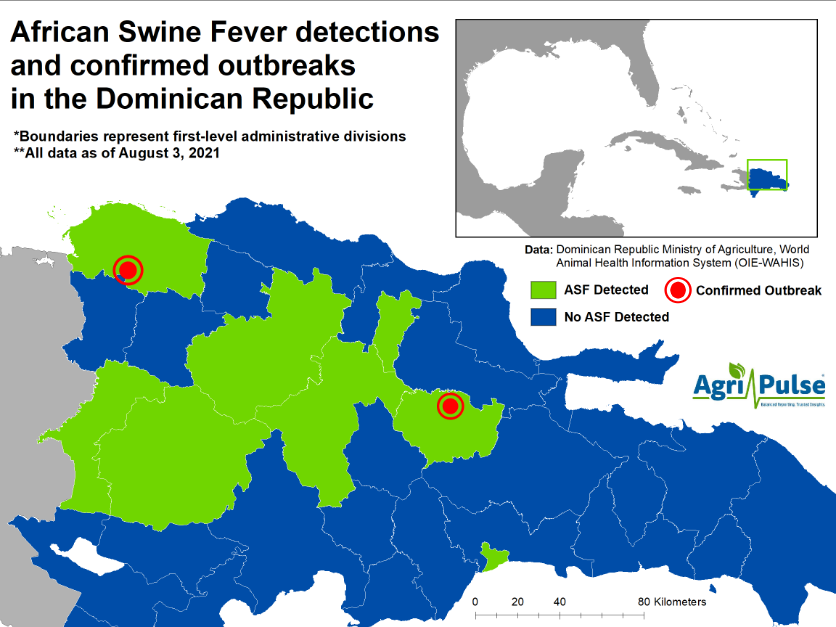The recent detection of African Swine Fever in the Dominican Republic has shone a spotlight on the prevention protocols in the United States for a disease that is closer to American shores now than it has been in roughly 40 years.
The disease, which the World Organization for Animal Health (OIE) says can have a mortality rate for affected pigs as high as 100% and does not yet have a cure, has forced China to destroy more than 1 million pigs over the last five years and ravaged countries throughout Africa, Asia and Europe.
“African Swine Fever has been coined as ‘volcanic lava,’" said Paul Sundberg, the executive director of the Swine Health Information Center (SHIC). “It doesn’t necessarily move really quickly, but it continues to move at a rather steady pace and it burns everything that it comes into contact with.”
The Dominican Republic officially reported two initial outbreaks in Sánchez Ramírez and Monte Cristi provinces to OIE’s World Animal Health Information System (WAHIS) on July 29. A total of 842 backyard-raised pigs — a relatively small number considering the estimated 1.8 million hogs that currently live in the country — were found to be susceptible. Four more outbreaks affecting a possible 14,135 pigs in Sánchez Ramírez province were announced by the Ministry of Agriculture in a release on Sunday.
But information released by the nation’s Official Commission for the Control and Eradication of Outbreaks of African Swine Fever on Monday indicates that it now may be present in 11 additional provinces.
ASF’s discovery in the Dominican Republic is frightening for the U.S., which has only about 700 miles of ocean separating it from the island and is home to approximately 75.7 million hogs, according to USDA's National Agriculture Statistics Service (NASS). A study last year by Iowa State University economists estimated that the virus could cost the U.S. pork industry about $50 billion in losses over 10 years if it were to enter the country.
Several outside agencies like the United Nations Food and Agriculture Organization, the Inter-American Institute for Cooperation on Agriculture, the OIE and the USDA have offered to assist the Dominican Republic with tracking and containing the disease.
“USDA is committed to assisting the Dominican Republic in dealing with ASF, is offering continued testing support, and will consult with them on additional steps or actions to support response and mitigation measures,” the department said in a release. “We will also offer similar help to Haiti, which borders the Dominican Republic and is at high risk for ASF detections.”

Paul Sundberg, Swine Health Information Center
ASF has not yet been found in neighboring Haiti, but the SHIC noted in a report that local news agencies have recently reported an increase in the mortality of pigs in the small border town of Anse-à-Pitres.
“The first outbreak in the Dominican Republic was very close to the border with Haiti, therefore we are concerned that, unfortunately, Haiti could already be or will be soon affected by this disease,” Monique Eloit, the OIE Director General, told Agri-Pulse.
The virus does not affect humans and, according to the OIE, can be spread by direct contact between hogs or indirectly through workers' clothes, vehicles, implements and ticks. It also circulates when food scraps containing infected meat are used as pig feed.
The last time the Dominican Republic dealt with ASF was in 1980. A two-year battle with the virus saw 192,473 culled pigs, according to the SHIC.
Last Wednesday, USDA put out an import alert notifying the world that all imports of live swine, swine germplasm, unprocessed pork products and pork byproducts from the Dominican Republic or Haiti were prohibited unless they were consigned to a USDA approved establishment or fully taxidermy finished.
The agency stated that processed pork products and byproducts in passenger baggage could only be imported if they met APHIS packaging and cooking requirements or were accompanied by official documentation confirming the products had been treated.
Both the Dominican Republic and Haiti were already subject to import restrictions on pork, along with every other Caribbean country except the U.S. Virgin Islands and Puerto Rico, due to the existence of classical swine fever — another viral disease that often proves fatal for swine — within those nations.
“The thing that is in our favor is that since classical swine fever is on the island of Hispaniola, in both countries, we have long since not had trade,” said Patrick Webb, acting chief veterinarian of the National Pork Board. “So that limits opportunities for the virus to move in through legally traded products.”
A USDA official told Agri-Pulse that after the detection of ASF was confirmed, USDA quickly reached out to Customs and Border Protection to ask the agency to heighten its efforts to detect any pork products travelers might try to bring in from the Dominican Republic or Haiti.
Rusty Payne, the director of media for CBP, told Agri-Pulse in an email the agency will be increasing inspections of flights from the Dominican Republic and ensuring that garbage from these airplanes is properly disposed of. It has been meeting with the National Targeting Center, the Office of Intelligence, the National Pork Producers Council, the American Feed Industry Association and APHIS to discuss agricultural trade and the use of canine teams in passenger pathways.
 APHIS will also be increasing the capacity of its National Animal Health Laboratory Network and plans to add ASF testing to its existing classical swine fever surveillance efforts, along with increasing inspections and enforcement of garbage feeding facilities to make sure that fed garbage is cooked properly, according to public affairs specialist Mike Stepien.
APHIS will also be increasing the capacity of its National Animal Health Laboratory Network and plans to add ASF testing to its existing classical swine fever surveillance efforts, along with increasing inspections and enforcement of garbage feeding facilities to make sure that fed garbage is cooked properly, according to public affairs specialist Mike Stepien.
Interested in more news on farm programs, trade and rural issues? Sign up for a four-week free trial to Agri-Pulse. You’ll receive our content — absolutely free — during the trial period.
If the virus were to be detected in the U.S., whether it comes in feral or commercial swine, all U.S. meat exports would likely be shut down immediately. Pork from about 30% of all the hogs raised in the U.S. is exported.
With the partial exception of Canada, the U.S. does not have any regionalization agreements with foreign countries when it comes to ASF. That means a detection in the U.S. could result in foreign countries initiating blanket bans on all U.S. pork — not just pork from affected regions.
The U.S. and Canada recently reached an agreement to keep trade intact if ASF is found in feral pigs on either side of the border.
“Continuing trade with Canada in the event of a feral African Swine Fever detection is important to our stakeholders, and this trade protocol provides the necessary guidance to minimize the impact to the swine industry,” USDA Chief Veterinarian Burke Healey said in a statement released in March. “This collaborative effort uses a science-based approach to ensure trade between both countries resumes as quickly as possible.”

Monique Eloit, OIE
The Dominican Republic is using “total military control” in certain points of the two affected provinces and announced it would be prohibiting the movement of live and slaughtered pigs across their borders, placing them in quarantine and conducting periodic epidemiological surveys within them.
Part of the reason ASF is so costly for affected countries is because depopulation and disposal efforts are necessary for pigs exposed to the virus. The few infected pigs that do survive an outbreak will become lifelong carriers of the virus. The meat of those that die is often contaminated.
"Pigs that are infected with ASF can also infect others,” Eloit said. “Therefore, in the absence of a vaccine, a stamping out approach should be considered as part of the control measures to stop the spread of this disease. That is not so easy to implement in backyard farms because sometimes you don't know exactly how many pigs there are, as well as whom they belong to. The socioeconomic consequences should also be considered."
The National Pork Board is encouraging all producers to establish biosecurity measures on their operations and sign up for AgView, which helps producers of all sizes and types provide disease status updates and pig movement data to state animal health officials. These measures include clothing and showering requirements, regular equipment maintenance, clear communication of farm rules, a well-thought-out loading system, attention to what supplies are being brought in and proper disposal of carcasses.
If producers notice a high fever, decreased appetite, weakness, red and blotchy skin, diarrhea, vomiting, coughing or difficulty breathing in their hogs, they should report those animals to their state or federal animal health officials.
For more news, go to www.Agri-Pulse.com.



